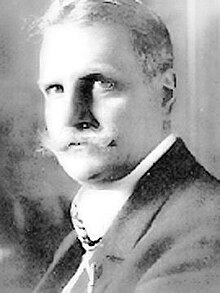 Global Information
Global InformationIron law of oligarchy information
This article needs additional citations for verification. (March 2023) |

The iron law of oligarchy is a political theory first developed by the German-born Italian sociologist Robert Michels in his 1911 book Political Parties.[1] It asserts that rule by an elite, or oligarchy, is inevitable as an "iron law" within any democratic organization as part of the "tactical and technical necessities" of the organization.[1]
Michels' theory states that all complex organizations, regardless of how democratic they are when started, eventually develop into oligarchies. Michels observed that since no sufficiently large and complex organization can function purely as a direct democracy, power within an organization will always get delegated to individuals within that group, elected or otherwise. As he put it in Political Parties, "It is organization which gives dominion of the elected over the electors. [...] Who says organization, says oligarchy."[2]
In 1911 using anecdotes from the histories of political parties and trade unions struggling to operate democratically, Michels considered his argument applicable to representative democracy at large.[1] He believed that "[h]istorical evolution mocks all the prophylactic measures that have been adopted for the prevention of oligarchy."[3][1]
According to Michels, all organizations eventually come to be run by a leadership class who often function as paid administrators, executives, spokespersons or political strategists for the organization. Far from being servants of the masses, Michels argues this leadership class, rather than the organization's membership, will inevitably grow to dominate the organization's power structures.[4] By controlling who has access to information, those in power can centralize their power successfully, often with little accountability, due to the apathy, indifference and non-participation most rank-and-file members have in relation to their organization's decision-making processes.[citation needed] Michels argues that democratic attempts to hold leadership positions accountable are prone to fail, since with power comes the ability to reward loyalty, the ability to control information about the organization, and the ability to control what procedures the organization follows when making decisions. All of these mechanisms can be used to strongly influence the outcome of any decisions made 'democratically' by members.[5]
Michels stated that the official goal of representative democracy, of eliminating elite rule, was impossible; that representative democracy is a façade legitimizing the rule of a particular elite; and that elite rule, which he referred to as oligarchy, is inevitable.[1]
Michels later migrated to Italy and joined Benito Mussolini's Fascist Party, as he believed that this was the next legitimate step of modern societies.
Michels' thesis became popular once more in the postwar United States with the publication of Union Democracy: The Internal Politics of the International Typographical Union (1956) by Lipset, Trow, and Coleman.
- ^ a b c d e Hyland, James L. (1995). Democratic theory: the philosophical foundations. Manchester, England, UK; New York, New York, USA: Manchester University Press. p. 247.
- ^ Michels, Robert; Paul, E.; Paul, C. (1915). Political Parties: A Sociological Study of the Oligarchical Tendencies of Modern Democracy. Hearst's International Library Company. p. 401.
- ^ de Vries, M. S. (2016). Understanding Public Administration. Bloomsbury Publishing. p. 69. ISBN 978-1-137-57546-3.
- ^ Zheng, Y. (2022). Civilization and the Chinese Body Politic. China Policy Series. Taylor & Francis. p. 416. ISBN 978-1-000-64239-1.
- ^ Michels, Robert (2001) [1915]. Political Parties: A Sociological Study of the Oligarchical Tendencies of Modern Democracy (PDF). Translated by Eden and Cedar Paul. Kitchener, Ontario: Batoche Books. p. 241. Archived from the original (PDF) on 12 May 2007.